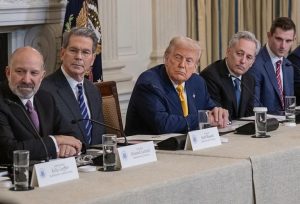In a historic policy shift, President Donald Trump has pledged to position the United States as a global leader in cryptocurrency, marking a significant departure from previous administrations’ approaches to digital assets. The announcement was made Friday during the White House’s first-ever “Crypto Summit,” where industry leaders and lawmakers gathered to discuss the future of digital currencies under Trump’s administration.
A New Era for U.S. Crypto Policy
Once a skeptic of digital currencies, Trump has now fully embraced the potential of blockchain technology and cryptocurrency markets. The summit featured key industry figures, including Cameron Winklevoss, co-founder of the Gemini cryptocurrency exchange, who praised the administration’s commitment to fostering innovation in the sector. Many attendees criticized the regulatory stance of President Joe Biden’s administration, which they argued had stifled investment and technological advancement.
Trump’s policy shift reflects a broader effort to establish the U.S. as a hub for cryptocurrency innovation. As part of this strategy, his administration has appointed several officials with deep ties to the industry. Among them are AI & Crypto Czar David Sacks, Commerce Secretary Howard Lutnick, and Treasury Secretary Scott Bessent. These appointments signal a clear shift toward a more crypto-friendly regulatory environment, with a focus on expanding economic opportunities in the digital asset space.
Regulatory Overhaul and Policy Changes
In addition to appointing pro-crypto officials, the Trump administration has taken steps to revise federal regulatory approaches to digital assets. Notably, enforcement actions against major cryptocurrency firms, including Coinbase, have been dropped. Moreover, the administration has elevated some of the most pro-crypto voices within regulatory agencies. Commissioner Hester Peirce, a longtime advocate for cryptocurrency adoption, now leads the SEC’s Crypto Task Force, ensuring that the industry receives more balanced oversight.
Perhaps the most groundbreaking move came when Trump signed an executive order establishing a Strategic Bitcoin Reserve and a United States Digital Asset Stockpile. This executive order directs the Department of the Treasury to consolidate Bitcoin obtained through asset forfeitures and legal proceedings, maintaining these holdings as reserve assets rather than liquidating them. The order also mandates a full review of all digital assets currently held by federal agencies and the development of a long-term strategy for managing and acquiring additional Bitcoin in a budget-neutral manner.
“The United States must harness, not limit, the power of digital assets for our prosperity,” the executive order states, emphasizing Bitcoin’s role as a unique store of value akin to “digital gold.”
Implications for the U.S. Economy and Financial Sector
Under the directive, the Treasury Department will oversee the new reserve, ensuring that Bitcoin and other government-held digital assets are strategically managed. The executive order outlines conditions under which digital assets may be utilized, including funding law enforcement operations, returning funds to crime victims, or fulfilling other statutory obligations.
The establishment of a Bitcoin reserve could have far-reaching implications for both the U.S. financial system and the broader cryptocurrency market. By legitimizing Bitcoin as a strategic asset, the administration is setting the stage for greater institutional adoption and investment in digital currencies. This shift is likely to encourage financial institutions to integrate cryptocurrency into their operations, potentially leading to wider mainstream adoption.
However, not everyone is convinced that the government’s involvement in cryptocurrency will be entirely beneficial. Critics argue that while increased regulatory clarity is welcome, the federal government’s direct participation in digital asset markets must be carefully managed to prevent unintended consequences, such as market distortions or financial instability. Additionally, concerns remain about how the government will balance innovation with necessary consumer protections.
What’s Next?
The Treasury Department and other federal agencies have been given a 30-day deadline to provide a full accounting of digital assets under their control. This review will serve as the foundation for future policy decisions regarding cryptocurrency holdings and potential acquisitions. Further evaluations on policy implementation and regulatory frameworks are expected in the coming months.
With this bold move, President Trump has placed the United States at the forefront of the global cryptocurrency conversation. His administration’s pro-crypto stance signals a new chapter for digital assets, one that could redefine the role of cryptocurrency in the U.S. economy and beyond. While challenges remain, the commitment to fostering innovation and investment in blockchain technology marks a pivotal moment in the evolution of financial markets.
As the world watches, the U.S. government’s approach to cryptocurrency may set a precedent for other nations. Whether this will lead to the widespread acceptance of Bitcoin as a key financial asset or introduce new complexities into global markets remains to be seen. One thing is certain—under Trump’s leadership, cryptocurrency is no longer on the sidelines but firmly at the center of economic policy discussions.



